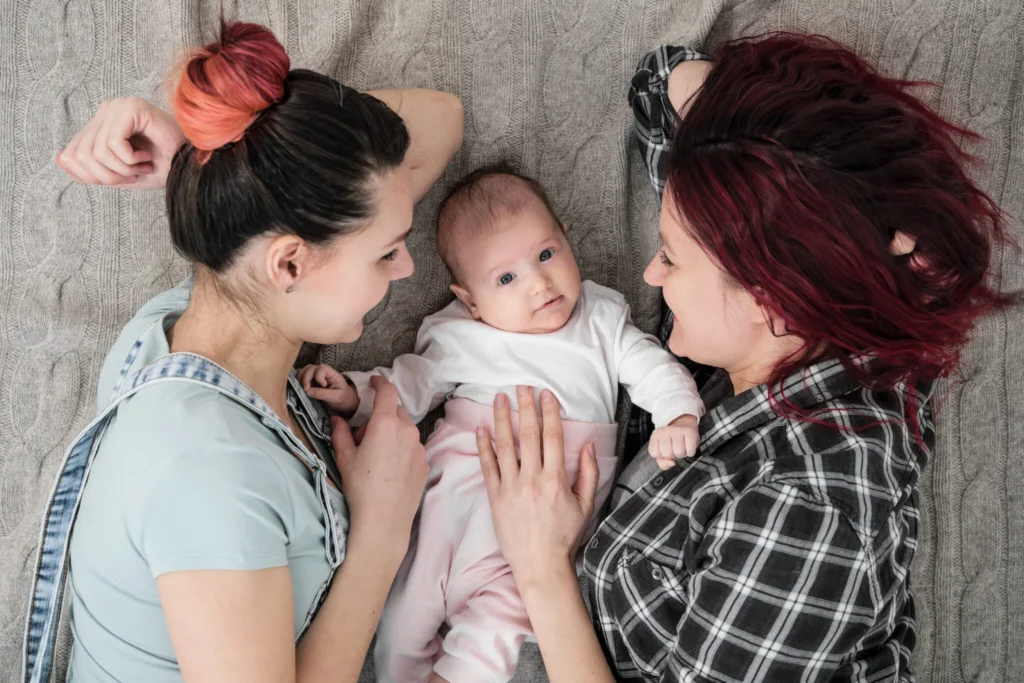IVF and LGBTQ+ Parenthood:
Options and Challenges
Parenthood is a deeply cherished aspiration for many, including individuals and couples within the LGBTQ+ community. Fortunately, advances in assisted reproductive technologies, particularly in vitro fertilisation (IVF), have made it possible for LGBTQ+ individuals and couples to fulfil their dreams of becoming parents. However, the path to LGBTQ+ parenthood through IVF presents unique options, considerations, and challenges. In this comprehensive guide, we will explore the various routes to LGBTQ+ parenthood via IVF and address some of the associated challenges and considerations.
IVF Options for LGBTQ+ Parenthood
IVF offers LGBTQ+ individuals and couples several avenues to build their families:
Gay Men:
- Surrogacy: Gay male couples can use gestational surrogacy, where a surrogate carries an embryo created using the sperm of one or both partners and donor eggs. This allows for a genetic connection with their child.
- Egg Donation: When using a gestational surrogate, gay male couples may opt for egg donation, utilising the eggs from a donor to create embryos. One partner’s sperm or donor sperm can be used for fertilisation.
- Sperm Donation: In cases where only one partner wishes to be a biological parent, sperm donation from the non-biological partner or a sperm donor is used to fertilise the donor egg. The resulting embryo is then transferred to the gestational surrogate.
Lesbian Women:
- Intrauterine Insemination (IUI): Lesbian couples may opt for IUI, a less complex procedure than IVF, where sperm (either from a known donor or a sperm bank) is placed directly into one partner’s uterus to facilitate conception.
- IVF with Donor Sperm: IVF using donor sperm allows one partner to become the biological parent while the other carries the pregnancy. Donor sperm is used to fertilise the eggs of the partner who wishes to conceive.
Transgender Individuals:
- Egg Freezing: Transgender individuals who wish to preserve their fertility before transitioning can opt for egg freezing. After transitioning, these eggs can be fertilised with donor sperm or partner sperm through IVF.
- Sperm Freezing: Transgender individuals can also opt to freeze their sperm before transitioning. Later, this sperm can be used for IVF, allowing for biological parenthood.
Unique Challenges and Considerations
While IVF opens doors to LGBTQ+ parenthood, it is essential to acknowledge and address the unique challenges and considerations that may arise:
Legal and Parental Rights:
- Second-Parent Adoption: In some jurisdictions, LGBTQ+ parents may need to pursue second-parent adoption to establish legal parental rights for the non-biological parent, particularly in cases involving surrogacy.
- Marriage Equality: The legal recognition of same-sex marriages and partnerships varies worldwide, impacting parental rights and access to fertility treatments.
emotional and psychological support:
- Counselling: IVF can be emotionally taxing for LGBTQ+ individuals and couples, as they may face additional layers of stress related to discrimination or societal expectations. Seeking counselling and support is crucial to navigating these challenges effectively.
Financial Considerations:
- IVF Costs: IVF treatments can be costly, and not all insurance plans provide comprehensive coverage. LGBTQ+ individuals and couples should be prepared for the financial aspects and explore potential sources of financial assistance.
Donor and Surrogacy Selection:
- Choosing Donors and Surrogates: Deciding on egg donors, sperm donors, or surrogates can be a complex process. Compatibility, genetics, and personal preferences play a significant role in these choices.
Stigma and Discrimination:
- Societal Bias: LGBTQ+ individuals and couples may encounter discrimination or bias during their fertility journey. This can be emotionally challenging, making it vital to seek supportive healthcare providers and communities.
Access to Fertility Services:
- Geographical Disparities: Access to fertility services and legal protections for LGBTQ+ parents can vary depending on the region or country, creating disparities in family-building opportunities.
Conclusion
IVF has revolutionised the landscape of LGBTQ+ parenthood, offering a range of options for individuals and couples to realise their dreams of becoming parents. However, navigating the path to parenthood as an LGBTQ+ individual or couple through IVF comes with unique challenges and considerations related to legal rights, emotional support, financial planning, and societal acceptance.
It is crucial for LGBTQ+ individuals and couples to be aware of their rights, seek supportive healthcare providers, and access counselling and emotional support. Additionally, a thorough understanding of the various IVF options available can help LGBTQ+ individuals and couples make informed decisions that align with their family-building goals.
As society continues to evolve and embrace diversity, the journey to LGBTQ+ parenthood through IVF becomes increasingly accessible, offering hope and empowerment to individuals and couples who wish to embark on this extraordinary adventure. With the right support and resources, LGBTQ+ individuals and couples can navigate the complexities of IVF with resilience, determination, and the profound love that defines parenthood.


